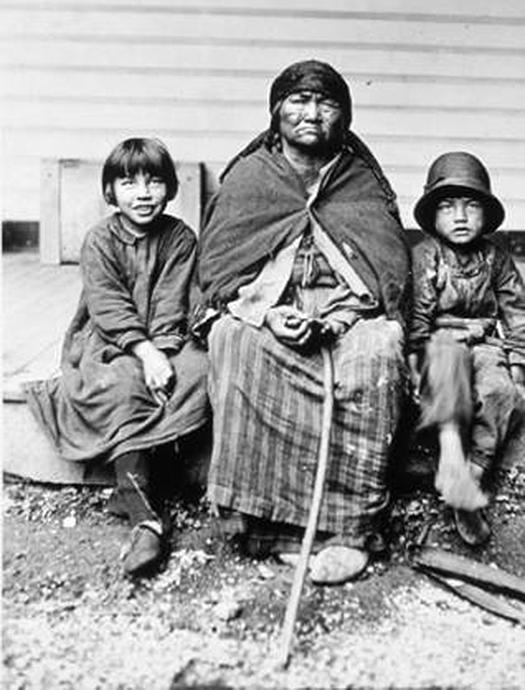
This Day in History — June 2, 1924: Congress Enacts the Indian Citizenship Act

Salish Woman and Children External, St. Ignatius Mission, Montana. 1924.
This Day in History
WASHINGTON — On June 2, 1924, Congress enacted the Indian Citizenship Act, which granted citizenship to all Native Americans born in the United States. The right to vote, however, was governed by state law; until 1957, some states barred Native Americans from voting. In a WPA interview from the 1930s, Henry Mitchell describes the attitude toward Native Americans in Maine, one of the last states to comply with the Indian Citizenship Act:
One of the Indians went over to Old Town once to see some official in the city hall about voting. I don’t know just what position that official had over there, but he said to the Indian, ‘We don’t want you people over here. You have your own elections over on the island, and if you want to vote, go over there.’
Just why the Indians shouldn’t vote is something I can’t understand.
“The Life of Henry Mitchell.” Robert Grady, interviewer; Old Town, Maine, ca. 1938-1939. American Life Histories: Manuscripts from the Federal Writers’ Project, 1936 to 1940. Manuscript Division
Previously, the Dawes Severalty Act (1887) had shaped U.S. policy towards Native Americans. In accordance with its terms, and hoping to turn Indians into farmers, the federal government redistributed tribal lands to heads of families in 160-acre allotments. Unclaimed or “surplus” land was sold, and the proceeds used to establish Indian schools where Native-American children learned reading, writing, and the domestic and social systems of white America. By 1932, the sale of both unclaimed land and allotted acreage resulted in the loss of two-thirds of the 138 million acres that Native Americans had held prior to the Dawes Act.
In addition to the extension of voting rights to Native Americans, the Secretary of the Interior commissioned the Institute for Government Research to assess the impact of the Dawes Act. Completed in 1928, the Meriam ReportExternal described how government policy oppressed Native Americans and destroyed their culture and society.
The poverty and exploitation resulting from the paternalistic Dawes Act spurred passage of the 1934 Indian Reorganization Act. This legislation promoted Native-American autonomy by prohibiting allotment of tribal lands, returning some surplus land, and urging tribes to engage in active self-government. Rather than imposing the legislation on Native Americans, individual tribes were allowed to accept or reject the Indian Reorganization Act. From 1934 to 1953, the U.S. government invested in the development of infrastructure, health care, and education, and the quality of life on Indian lands improved. With the aid of federal courts and the government, over two million acres of land were returned to various tribes.
The post This Day in History — June 2, 1924: Congress Enacts the Indian Citizenship Act appeared first on Native News Online.
